Hello,
I’m sorry to hear about your kitten.
There isn’t enough information here for me to offer much advice. But if you think something this severe is going on you absolutely need a vets help.
If this was truly gangrene your kitten would not be able to walk and I suspect they would be liking the legs like crazy.
Your vet needs to examine this kitten to see if this is a skin infection, skin discoloration or deeper problem. Kittens are also incredibly resilient but there is a much better prognosis for your kitten if it is treated as quickly as possible. Too often people wait until a small problem becomes a huge problem. So please go see the vet as soon as possible.
Very best of luck.
Dr magnifico
I have a 5 week old kitten I’m fostering that broke it’s leg last night at the elbow. We saw a neighborhood vet that said we could take it to a surgeon, which would be very costly. Or just let it heal on its own. He said if we let it heal then we shouldn’t put it in a splint or anything because of where it’s broken. I feel it should have a splint. Thoughts?
Comments
My 3 day old kitten’s hind paws are all black, and the part above it looks red with small bleeding wounds. To me it looks like gangrene. I have no idea how it happened, the kitten was with me since birth. I will take him to the vet as soon as possible, but in the meantime…
What can I expect? Does gangrene mean euthanasia for this poor baby? I’m not sure they can operate on kittens this small…
He has this on both hind legs, sadly.
Comments
Help!
We rescued a 4 week old kitten and immediately noticed his butt area was different than we’ve ever seen but it did not seem to cause him any pain. Initially he was doing well until he began having diarrhea and mucus/blood in his stool. We brought him to the vet and turns out he had a parasite called Coccidia. It was treated with a 10 day oral medication and we believed everything would be fine afterwards.
After the diarrhea subsided he began to be constipated to the point we had to bring him back to vet twice within a week for him to be sedated and his bowels to be manually released. They have no idea what would cause this.
We went to a specialized vet clinic and they said they could dilate the anus/rectum to help him pass his stool (may not help or may have to constantly have redone) or do a exploratory surgery to see if any tissue or something is in the intestines and such that stops him from passing by himself.
Our personal vet clinic says his anus is abnormal which may mean that he lacks the muscles to be able to push out his own stool.
We have researched online and found a couple pictures of kittens after they have had a prolapsed rectum and they look similar and symptoms seem about the same. He just does not have anything coming out of him.
Does anyone have any advice or personal experience that can help us? The specialized vet says if we can’t figure out what is causing this it would be best to euthanize him so he does not suffer. We do not want to do that. He is the sweetest and most playful kitten.
Comments
Last summer my healthy, energetic 6 year old cat stopped eating, became lethargic. A trip to the vet turned into a trip to emergency where he spent a day and a half. The dx was hepatic lipidosis – or at least that’s what was happening to him due to something else. He got better. Didn’t return to previous weight (which was okay – he was a couple pounds overweight at the time) but he was back to his happy self.
A couple of months ago, he dropped a bunch of weight, but was still eating. Off to the vet for a blood draw. Low RBC. A trip to the emergency, where he got a transfusion, an ultrasound, and a huge variety of in-depth blood tests to find out what was happening. My vet thought cancer, but the results weren’t showing cancer. The results weren’t showing much of anything. I had no diagnosis. He was placed on prenisolone and an antibiotic. He went for weekly bloodwork. No significant change – and then it was going down again (RBC). Off the antibiotic since it wasn’t doing anything.
We were going to start him on B12 (cobalquin) and then he took a turn for the worse. Hiding away, no eating, no moving. I used a syringe to feed him and still gave him his steroid. He hid in his cat condo, peed in there but wouldn’t move. I set up a temp litter box and feeding area by the condo, and slept on the floor with him. I didn’t expect him to live through the night. In the middle of the night he came out and sat on me. The next day he moved more. And then – he got better. Moving, eating, jumping. Except for being too thin, he was acting just like his normal self.
That was about a month ago and I have been working to give him calories to have him gain weight. A week ago – we’re slowing down again. Sleeping a lot, not eating at the food bowl. So, I have begun using syringe feeding with kitten food (for higher calories) and a calorie/vitamin supplement. He gets B12 and the prednisolone daily. I’m assuming he’s going through the lipidosis issue again, but now that I recognize it I can catch it early and get feedings going.
My questions – how often should I be syringe feeding? I know my cat will only tolerate so much before he gets irritated and walks away, but I can get 10-20 ml in him at one time. I understand a feeding tube would probably be easier, but this cat has been through a lot and I’m trying to make him comfortable and happy and relaxed.
What could be causing this? My vet has been great at trying to find solutions, the specialist/internist didn’t really have any other suggestions, and I’ve been trying to find anything online about illnesses that could cause this drop in health so quickly. (This is an indoor cat, and my other cat is fine.)
Thanks for any help!
I hope this email finds you well. I wanted to provide you with an update regarding my kitten’s condition and share the findings from another veterinaries opinion I sought.
As previously discussed, I took my kitten to two different veterinarians for examination and attached their report for your reference. They provided their own insights and suggestions for potential treatment.
Additionally, the second veterinarian suggested exploring the possibility of physical therapy (PT) as a potential avenue for helping my kitten. He mentioned that PT has shown positive outcomes in some cases of mobility issues in animals. I wanted to seek your professional opinion on this matter and discuss the feasibility and potential benefits of PT for my kitten’s condition.
I greatly value your expertise and I am seeking your guidance in determining the best course of action for my kitten’s well-being.
If you could kindly review the attached report and provide your thoughts I will be appreciated.
Comments
I am writing to seek guidance and assistance regarding a concern I have about my four-week-old kitten. Last week, I noticed that her legs do not bend from the joint, and I am unsure of what steps I should take to address this issue. While she can move her legs, she is unable to walk and instead crawls using her front legs. I believe this condition may have been present since birth, as there have been no accidents or injuries that could have caused it.
I would greatly appreciate any advice or assistance that you or anyone else could provide in helping my kitten. She is a Scottish kitten
Thank you in advance for your attention and support.
Comments
My cat recent started taking a pill. The first couple days mixing in food worked but now she takes a few licks and is done with it. There must be a taste because she is not having it. How else can I give it to her? We have tried wet cat food, tuna, like a purée kitten treat. She won’t touch it. Am I able to just kinda shove it down her throat? Would icing in a small bit of water and putting in a syringe work?
Comments
Please help! I have never owned a cat before, actually I am allergic. The Universe dropped two kittens in my lap that the mother never returned for. On of the kittens dies. I had them before their eyes were open. Through some good people at my vet I was able to learn some things (the hard way) and able to raise the kitten off the bottle. I have the kitten and named her Luna. And to say the least Luna is a handful. She acts feral when new people are around or I take her to the vet. She attacks everything and she is rarely calm enough to love on. She has peed in my tub one time before a couple weeks ago but today she pooped and then hours later peed in my tub. The same day. Today actually. Please if anyone knows anything about bottle baby kittens or has any advice please help.
Comments
Hi everyone,
It’s my first time to have a pet her name is Kumiko i got her when she was only 3month now she’s already 6months. When i got her her fur parents didn’t told me initially that her mother got her tail degloved. She was born inverted butt first so her mom accidentally degloved her tail. I have been treating her since then. Her tail will dry up and will last for 4-7days then the skin sheds and bleeds. She’s been wearing Elizabeth collar since then. I am getting desperate already. I consulted a Vet and now they are suggesting to have it amputated. There is no current infection but it doest heal properly. Hope someone can help me. I still don’t want her to get amputated.
Comments
Why are the majority of Harford County veterinarians charging $400-$650 to spay/neuter a cat or kitten? Only a few offer under $200 surgeries for what is generally a very simple and quick procedure – I know, as I assist at low-cost spay/neuter clinics. Cecil County, Baltimore County, Baltimore City, Anne Arundel County all offer the same procedure for less than half the going rate in Harford. Several local veterinarians, when clients balk at pricing, are referring them to rescue groups rather than offering a reasonable price for an operation that is ESSENTIAL to the animal’s well-being and longevity, not to mention eliminating unwanted litters.
What can Harford residents do to force changes to make our county more cat friendly and help owners wanting to do what’s right but not at unreasonable cost?










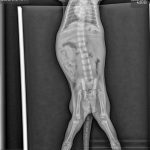
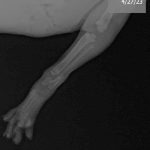


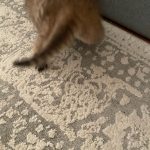
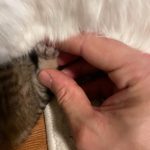



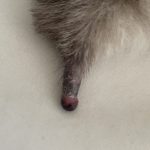


I mean, I’d listen to the vet. I’d also see if the organization you’re fostering through would be willing to pay for the surgery.
Kitties are rebellious to injuries, but most HATE being wrapped in anything…
Surgery may or may not be needed, but with kittens constantly growing, it would not jump straight to it!
Confining them to a smaller space and keeping them “confined” is a good place to start.
If the kitty does not seem to be improving with the break, some vets may talk about amputation as well. Radiographs may be helpful to see where exactly the break is to further choose the best decision for the kitty.